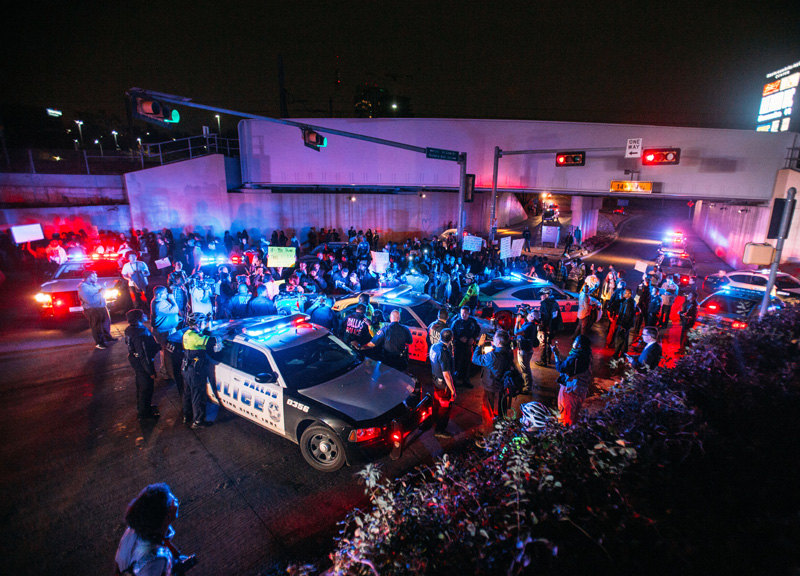Is The DPD Really The Model Police Department That Everyone Keeps Saying It Is?
According to Twitter and a hot new T-shirt, folks have been so impressed with Dallas Police Chief David Brown of late that they’d be cool with him being our country’s next president.
That’s pretty interesting given that, back in March, there were many groups calling for his resignation. Of course, that was prior to his deft handling of the media in the wake of the recent police officer shootings, and before a number of marvelously moving speeches he gave at gatherings like the interfaith memorial service at the Meyerson last week, which also boasted lengthy remarks from President Obama.
Yeah, Chief Brown’s pretty universally adored these days.
It’s a situation that’s not all that dissimilar to that of former New York Mayor Rudy Guiliani, who wasn’t at all as well-regarded on September 10, 2001 as he was following his own fairly wonderful response in the wake of one of our nation’s biggest tragedies — to the extent that Time went on to call him “Mayor of the World” when they named him their Person of the Year for 2001.
In the last 10 days, the Washington Post, the Wall Street Journal, The Atlantic, Buzzfeed and Slate have all praised Brown’s tenure as Dallas’ police chief and called his DPD a “model” department.
But is the DPD really that great? Or is this just another symptom of the Guiliani effect?
Policing in 2016 is a tricky topic, and the above is an expectedly complicated question. Model or no, the DPD certainly has its share of favorable stats, along with a slew of less than enviable ones as well.
Between 2009 and 2014, excessive force complaints against DPD dropped by 64 percent. And officer involved shootings have also dropped in the past four years, from 23 in 2012 down to 11 in 2015. And, for more than a year, outlets like the Washington Post have credited Dallas’ favorable numbers with Brown’s “community-oriented approach to policing, openness and transparency about excessive force, its rejection of law enforcement as a revenue generator, and its First Amendment-friendly approach to protest.”
But some of that community-oriented approach, others say, is undermined by the fact that only about 20 percent of DPD officers actually live in Dallas. The argument for why this is problematic is that this leads to a perception that officers are “an occupying force in the neighborhoods they patrol, rather than a trustworthy source of assistance.”
Still, there’s been plenty written of late that touts Dallas PD. And those compliments are by no means undeserved. But while Dallas might be an example of one of the country’s better police departments, it should be noted too that the DPD is still far from perfect. Officers are leaving en masse, citing a high workload, excessive hours and pay that starts at $10,000 to $15,000 less than what surrounding cities pay their officers.
Also not to be forgotten: Following a historic-low murder rate in 2014, numbers jumped 17 percent in 2015, and are up 40 percent again this year, thanks to an especially deadly March.
DPD’s Public Information Officers also don’t always show the best judgement, as was shown when they recently called person of interest Mark Hughes a “suspect” via Twitter, and then left it up for 17 more hours. And some of the department’s other officers are even worse, like the ones making racist social media posts.
There’s also the issue of funding at large — not the department’s fault, necessarily, but a likely culprit when it comes to its issues. Things have gotten so bad that local billionaires donate their own cash to improve security in areas like Oak Lawn, following a staggering number of hate crimes there. Other neighborhoods are even using Public Improvement District funds to pay off-duty officers to beef up efforts in their necks of the woods.
Elsewhere, some of DPD’s new, innovative tactics are setting precedents that aren’t universally agreed upon as a positive thing. For example, DPD recently became the first department in the country to kill a suspect by using a robot while taking down alleged Dallas shooting perpetrator Micah Johnson.
All of this is not to say that Dallas doesn’t boast one of the best police departments in the country. Many facts, figures and op-ed pieces, in fact, do give one the impression that things in the department are pretty favorable these days.
By all accounts, Brown has done a terrific job reforming the Dallas police department. It’s something we hope he’s able to continue to do in spite of cities’ tendency to make it hard for community-oriented leaders in the wake of violent events.
We’re just saying that, through all this supportive coverage, it’s important to not turn a blind eye to the many concerns. Relatively good as things may appear to be, perfect they ain’t. Not yet, anyway.

